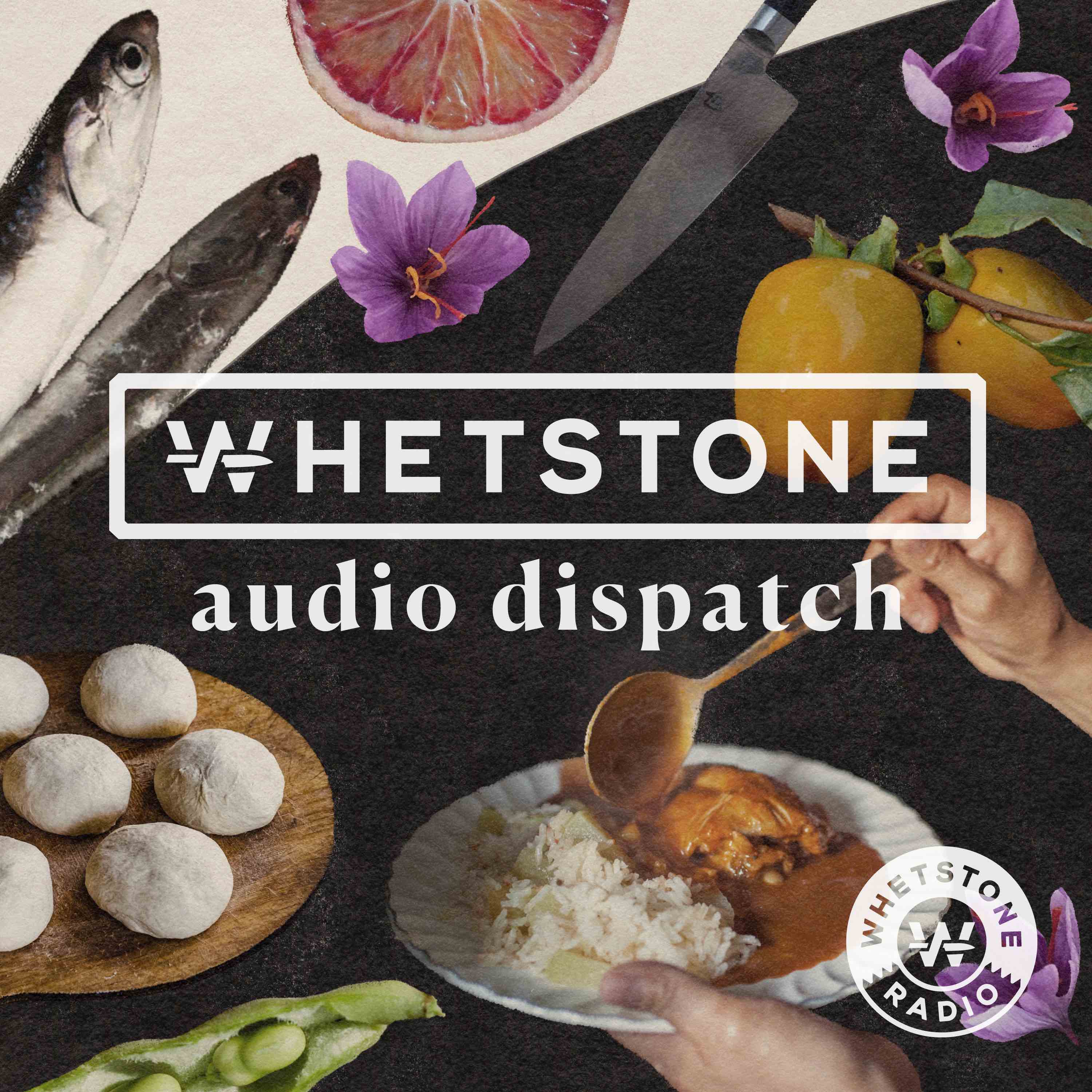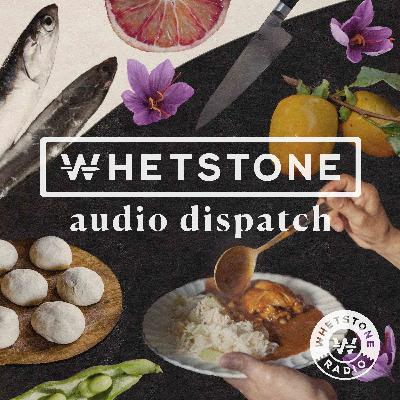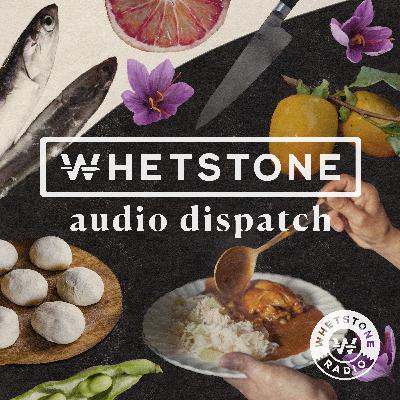Discover Whetstone Audio Dispatch
Whetstone Audio Dispatch

Whetstone Audio Dispatch
Author: Whetstone Radio Collective
Subscribed: 20Played: 73Subscribe
Share
© 2022
Description
Whetstone Audio Dispatch is a series of remarkable one-off episodes about global foodways exploring community, climate, activism and politics brought to you by journalists and reporters from around the world. Think of it as a storytelling popup, a one-pot feast serving up fresh ideas and best-in-class reportage about current events, food sovereignty, seed keeping, food origins, ancestral recipes and culinary anthropology. Hosted by Whetstone founder Stephen Satterfield.
Whetstone Audio Dispatch is part of Whetstone Radio Collective. Whetstone Radio Collective creates storytelling dedicated to food origins and culture, with original content centering the perspectives of global majority populations and diasporas.
You can learn more about this podcast at whetstoneradio.com, on Twitter @whetstoneradio, on TikTok and Instagram @whetstonemedia and subscribe to our Spotify and YouTube channel, Whetstone Media, for more podcast content. You can learn more about all things happening at Whetstone at WhetstoneMedia.com.
Whetstone Audio Dispatch is part of Whetstone Radio Collective. Whetstone Radio Collective creates storytelling dedicated to food origins and culture, with original content centering the perspectives of global majority populations and diasporas.
You can learn more about this podcast at whetstoneradio.com, on Twitter @whetstoneradio, on TikTok and Instagram @whetstonemedia and subscribe to our Spotify and YouTube channel, Whetstone Media, for more podcast content. You can learn more about all things happening at Whetstone at WhetstoneMedia.com.
7 Episodes
Reverse
What if a simple loaf of bread could tell the story of an entire place, its resilience, its politics and poetry? In this episode of Whetstone Audio Dispatch, host Meher Varma takes us deep into the heart of Srinagar, Kashmir, where the unmistakable aroma of freshly baked tchot leads her to the neighborhood kandur, a traditional bakery that’s far more than just a place to buy bread.Through conversations with bakers, poets, and everyday customers, we uncover how these bakeries, modest structures built of brick and smoke, have become cornerstones of community life, sacred tradition, and resistance. We meet legendary Zareef Ahmed Zareef, who traces the 4,000-year-old roots of Kashmiri baking, and listen to local myths where mystics emerge from tandoors bejeweled and unburned.Whether it’s feeding a neighborhood during a curfew, sharing unspoken trust through pay-later systems, or trading morning news, bread becomes a portal into an unseen Kashmir, one where bread is more than sustenance; it is survival, spirit, and social glue.This episode was made possible by the support of @heirloomcities
Gardening on Water: The Dal’s Ancient Floating GardensFor thousands of years, Kashmir has been called jannat (heaven) by Urdu poets, travelers, and tourists. The Dal Lake in Srinagar is a jewel in its crown. Flamingo pink lotuses carpet the waters, and shikaras —small wooden boats— row upon it, making the destination a favorite for Instagram-loving honeymooners. However, deep in the Dal is a world less visible: its floating gardens. In Gardening on Water, Meher Varma, returns with a two-part audio dispatch from Srinagar, introducing us to the political complexities that challenge the reductive depiction of 'Kashmir as heaven on earth.’ Join us as we row you through the majestic and complex world of Dal's Floating Gardens. This episode was made possible by the support of @heirloomcities
Whetstone Media brings you an urgent reported episode of Whetstone Audio about the unfathomable and unrelenting war in Palestine and Gaza. As many as 100,000 Palestinian families depend on native and centuries-old olive and grape crops for their livelihood. We spoke with two Palestinian farmers living in the West Bank about how they have been devastatingly impacted: Nader Muaddi, owner of Muaddi Distillery producing grape-based Arak, and olive farmer Nasser Abufarha, owner of Canaan Palestine.The Israeli army and settlers in the West Bank have not only banned Palestinian families and farmers from accessing their land but have systematically burned farmers’ crops and harvests to the ground.To support these farmers? Follow Muaddi Distillery @muaddi_craft_distillery to learn how Nader works to preserve arak. Or, purchase Canaan olive oil @canaan.palestine. You can also learn more about hospitality workers taking action for Gaza at Hospitality For Humanity.Hosted by Stephen SatterfieldProduced by Celine GlasierWhetstone Audio Dispatch is part of Whetstone Radio Collective. Follow us on social @whetstonemedia. Learn more about Whetstone Media at https://www.whetstonemagazine.com/ Subscribe to Whetstone Audio Dispatch wherever you get your podcasts.
We bring you a very important episode of Whetstone Audio Dispatch. Recently, host Stephen Satterfield spoke with C.W. Mallery, a Black farmer in El Paso, Colorado who has been the victim of racist terrorism on his own property. He and his wife Nicole, his farm and his animals have been experiencing various horrific forms of violence and anti-Black terrorism. C.W. and Nicole relocated to Colorado after a hurricane displaced them. Part of his farm, Freedom Acres Ranch, mission is the education of inner city youth and underserved communities about where food comes from to encourage everyone to grow their own foods and pursue careers in agriculture. Call to Action: There are ways we can all help C.W. You can donate to his CashApp: $Blackfarmland or their GoFundMe: https://gofund.me/6269d6f4 You can sign the petition: https://chng.it/fSz6zjtPcy and share this episode to raise awareness and provide further support. Funds will be used for attorney fees, enhanced security systems, drones, night vision, thermal vision, privacy fencing, fence repair, security teams and equipment.If you’re local to El Paso, Colorado there’s a protest at the Denver Capital 2/17/2023 at 9am - 1pm you can join to demand investigation, termination and hate crime charges against Deputy Emory Gerhart. Demand Emory Gerhart be placed on the Brady List and all cases that Emory presided over be investigated for lies, discrimination, bias and false accusations. You can visit and stay on Freedom Acres Ranch for a campout the weekend of 2/17/2023- 2/19/2023. Support for Legislation: Caution Against Racially Exploitive Non-Emergencies Act (C.A.R.E.N Act) works to criminalize racially motivated emergency calls. Will make it a hate crime to weaponize the police against people of color. Call the following to demand an investigation into hate crimes, refusal to provide service to Black people, civil rights vioolations and violation of victim rights with threats and retaliation against Black people. Governor Polis: 3038662471Attorney General Phil Weiser: 7205086000Senator Hickenlooper: 3032441628Representative Negeuse: 9703723971FBI Denver Office: 3036297171NAACP National: 4105805777ACLU National: 2125492500This show was produced by Executive Producer Celine Glasier and edited by Ilgin G. Korugan. Music by Catherine Yang.
Sri Lanka is in the middle of a burgeoning crisis. With the island nation facing the worst economy crisis in its history, citizens have been left to bear the brunt — with fuel shortages, hours-long power cuts, and a critical shortage in essential commodities such as milk powder and rice. These difficulties have spurred people’s protests across the country. Public anger has been directed towards the country’s ruling party — and the strongman President, Gotabaya Rajapaksa. In the second episode of Whetstone Audio Dispatch, journalist Kris Thomas attempts to get to the heart of this multifaceted crisis. He revisits the Sri Lankan President’s decision to ban the import of chemical fertilizers — an electoral promise that has had a seismic effect on the country’s agricultural sector. Even as the citizen protests have taken on a larger symbolism as an uprising against corruption and power, Kris reminds us that the country’s food security — both in the immediate and the long term — hangs precariously in the balance. In this episode, hear from protestors expressing their frustration at the lack of basic items such as milk powder, academics who discuss the controversial fertilizer ban and farmers who discuss their falling yields. Whetstone Audio Dispatch is part of Whetstone Radio Collective. Learn more about Whetstone Audio Dispatch here.Find show notes here.And transcript here.
The most consumed food product in Tunisia is a white bread flute, a baguette, sold at the price of 7 or 9 cents, depending on the size. At its best, it is like a cloud on the inside and crispy on the outside.This inaugural episode of Whetstone Audio Dispatch reporter Layli Foroudi tells the story of how this breadstick came to dominate Tunisian diets and how it relates to the country’s fragile food security. And yet, while this bread could be seen as a symbol of oppression— the Tunisian baguette has also fueled revolutions and has become a symbol of resistance in the country.Today, shipments of wheat have been sitting outside the port pending payment, flour is rationed in supermarkets (when it is available) and prices are set to rise again due to the war in Ukraine.The impending social explosion combines the baguette's dual nature: it is rooted in a history of oppression and it is a source of protest and resistance, which is about more than bread, as we are told by Ahmed Ben Massoud: "It means don't touch my very low level of living."Whetstone Audio Dispatch is part of Whetstone Radio Collective. Learn more about Whetstone Audio Dispatch here.Find show notes here.And transcript here.
Whetstone Audio Dispatch is a series of remarkable one-off episodes about global foodways exploring community, climate, activism and politics brought to you by journalists and reporters from around the world.Premiering Friday, March 25, and hosted by Stephen Satterfield (@isawstephen).







